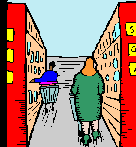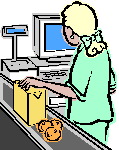Questions to ask in a Grocery Store
Supermarket Vocabulary
|
| 1. aisle | what the rows in a grocery store are called | 
| ||
| 2. cashier | the person who rings up your groceries and takes your money | 
| ||
| 3. coupon | a piece of paper that gives you a discount | 
| ||
| 4. dairy section | the section of the supermarket where you can find milk, eggs, and cheese | 
| ||
| 5. deli | the area of the supermarket where you can buy meats, cheeses, and salads. | 
| ||
| 6. frozen food section | the section of the supermarket where you can find frozen foods | 
| ||
| 7. health and beauty aides | the section where you can find shampoo, toothpaste, and medicines |

| ||
| 8. meat department | the section where you can find beef, chicken, and pork | 
| ||
| 9. produce | the section where fresh fruits and vegetables are found | 
| ||
| 10. receipt | a piece of paper that the cashier gives you that shows what you bought | 
| ||
| 11. seafood department | you may buy fish, shrimp, crab, and lobster here | 
| ||
| 12. shopping cart | you push this around the store; it holds your groceries | 
| ||
A grocery store is also called a supermarketor a greengrocer. Chain grocery stores are referred to by name. Learn the names of these stores before you travel to a new country. Superstores or department stores often have full grocery sections inside.
Shop Smart
Grocery stores are set up for you to buy more than you need. Fresh foods and staples are usually placed in the outside aisles or at the far end of a grocery store.
At the front you will find convenience foods and sale items. At the checkout you will find things you probably don’t need, such as chocolate bars and magazines. The store is counting on you to throw a few of these items into your cart or basket. This is called impulse shopping. Can you resist the temptation?
Gathering and packing
 Most grocery stores offer a variety of options for gathering and packing items. Don’t be surprised if you have to buy your bags.
Most grocery stores offer a variety of options for gathering and packing items. Don’t be surprised if you have to buy your bags.
- shopping cart: pushcart on wheels (you may have to put a coin deposit in the slot)
- basket: plastic container with handles; useful for quick grocery trips when you only need a few items
- box:sometimes available for free at the checkout
- plastic or paper bags: you may have to pay for these
- reusable bags: bring your own (or buy and reuse)
Main Aisles and Sections
Here are the main aisles (or sections) in a grocery store as well as some example items you will find in them.
produce:fresh fruit and vegetables
frozen food: juice, pizzas, fruit and vegetables
bulk food:peanuts, candy, flour, snacks (You bag yourself. You choose the amount.)
baking: pre-packaged goods such as flour, sugar, salt, and chocolate chips.
breads:packaged breads, bagels, hamburger and hot dog buns
meat and seafood: packaged beef, chicken, fish
deli:freshly sliced meats and cheeses (You tell the butcher how much you want.)
bakery: fresh breads, muffins, cakes to order
dairy:milk, eggs, dairy, yogurt
pasta and rice:spaghetti, penne, wild rice, whole wheat pasta
ethnic foods:foods from countries in other parts of the world
canned foods: beans, pasta sauce, canned fruit and vegetables
condiments: ketchup, BBQ sauce, salad dressings, oil
snacks:chips, packaged candy, cookies, crackers
cereal:boxed breakfast cereals and bars, oats, granola.
beverages:juice, pop, coffee, tea,
household items: toilet paper, tissue paper, garbage bags, detergent, diapers
health and beauty and or pharmacy: make up, deodorant, feminine products, medicine
Checkout
 Read the signs above you before you get into a line.
Read the signs above you before you get into a line.
- express checkout:For people buying a few items. The sign will show how many items you are allowed to have (1-12).
- automatic checkout: You swipe and bag your own groceries and pay with a credit or debit card.
- closed: Many stores use a lighting system to show which line ups are open for service. If the light is on the aisle is likely open.
Questions to ask in a Grocery Store
You don’t always need to ask someone who works in the store. The shopper next to you may be able to tell you where to find the sugar.
- Can you tell me where the produce section is?
- Can you do a price check for me?
- Do you have prepackaged candy?
- Do you have more flour in the back? (if a shelf is empty)
- Is this on sale?
- Do you sell stamps, lottery tickets, alcohol? (grocery stores in some countries are not licensed to sell alcohol)
Discounts
Do you have a discount card? Many clerks will ask this. Membership cards at grocery stores are usually free. They provide you with a discount on many items. Are you going to use this store a few times? Fill out a form and get a card! It will be worth your time. If you don’t have a card, don’t be fooled by the prices on food. Many foods are advertised at membership prices. Without a card you’ll pay a higher price. Brand-name items are typically more expensive than no-name or store-named items.
Common Courtesy
If the person behind you only has one or two items, you can invite the shopper to go in front of you. Say, “You can go ahead of me. You’re just buying a few things.” If there is a divider (small stick) on the conveyor belt at the checkout, place it after your items. This will allow the person behind you to start placing his or her groceries down too.
Grocery Shopping Tips
Did you write out a list? Creating an English grocery list is a fun and simple way to practise English. You can even create a master listusing the sections above. Add subcategories for all the foods you normally buy. Leave extra spaces for special items that you need once in a while. If you’re shopping with children, bring a snack or toy!